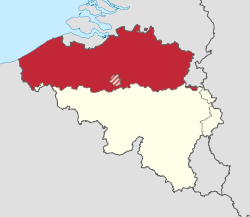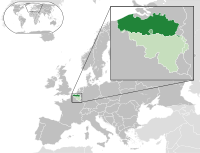
Flanders is the Dutch-speaking northern portion of Belgium and one of the communities, regions and language areas of Belgium. However, there are several overlapping definitions, including ones related to culture, language, politics, and history, and sometimes involving neighbouring countries. The demonym associated with Flanders is Fleming, while the corresponding adjective is Flemish, which can also refer to the collective of Dutch dialects spoken in that area, or more generally the Belgian variant of Standard Dutch. The official capital of Flanders is the City of Brussels, although the Brussels-Capital Region that includes it has an independent regional government. The powers of the government of Flanders consist, among others, of economic affairs in the Flemish Region and the community aspects of Flanders life in Brussels, such as Flemish culture and education.

The politics of Belgium take place in the framework of a federal, representative democratic, constitutional monarchy. The King of the Belgians is the head of state, and the prime minister of Belgium is the head of government, in a multi-party system. Executive power is exercised by the government. Federal legislative power is vested in both the government and the two chambers of parliament, the Senate and the Chamber of Representatives. The federation is made up of (language-based) communities and (territorial) regions. Philippe is the seventh and current King of the Belgians, having ascended the throne on 21 July 2013.

Belgium is a federal state comprising three communities and three regions that are based on four language areas. For each of these subdivision types, the subdivisions together make up the entire country; in other words, the types overlap.

The Kingdom of Belgium is divided into three regions. Two of these regions, Flanders and Wallonia, are each subdivided into five provinces. The third region, Brussels, does not belong to any province, nor is it subdivided into provinces. Instead, it has amalgamated both regional and provincial functions into a single "Capital Region" administration.

The Flemish Parliament constitutes the legislative power in Flanders for matters which fall within the competence of Flanders, both as a geographic region and as a cultural community of Belgium.

The Parliament of the Brussels-Capital Region, is the governing body of the Brussels-Capital Region, one of the three regions of Belgium. It is also known as the Brussels Regional Parliament.

In Belgium, the French Community refers to one of the three constituent constitutional linguistic communities. Since 2011, the French Community has used the name Wallonia-Brussels Federation, which is controversial because its name in the Belgian Constitution has not changed and because it is seen as a political statement. The name "French Community" refers to Francophone Belgians, and not to French people residing in Belgium. As such, the French Community of Belgium is sometimes rendered in English as "the French-speaking Community of Belgium" for clarity, in analogy to the German-speaking Community of Belgium.

The Flemish Region, usually simply referred to as Flanders, is one of the three regions of Belgium—alongside the Walloon Region and the Brussels-Capital Region. Covering the northern portion of the country, the Flemish Region is primarily Dutch-speaking. With an area of 13,626 km2 (5,261 sq mi), it accounts for only 45% of Belgium's territory, but 58% of its population. It is one of the most densely populated regions of Europe with around 500/km2 (1,300/sq mi).

The Vlaamse Gemeenschapscommissie is the local representative of the Flemish authorities in the Brussels-Capital Region, one of the three regions of Belgium. The VGC depends on the Flemish Parliament, and its council is made up by the members of the Dutch linguistic group of the Brussels Parliament, whereas its executive is made up of the two Flemish ministers and the Flemish secretary of the Brussels-Capital Government.

In Belgium, there are 27 municipalities with language facilities, which must offer linguistic services to residents in Dutch, French, or German in addition to their single official languages. All other municipalities – with the exception of those in the bilingual Brussels region – are monolingual and offer services only in their official languages, either Dutch or French.

Brussels-Halle-Vilvoorde is a judicial arrondissement encompassing the bilingual—French and Dutch—Brussels-Capital Region, which coincides with the administrative arrondissement of Brussels-Capital and the surrounding Dutch-speaking area of Halle-Vilvoorde, which in turn coincides with the administrative arrondissement of Halle-Vilvoorde. Halle-Vilvoorde contains several municipalities with language facilities, i.e. municipalities where French-speaking people form a considerable part of the population and therefore have special language rights. The arrondissment is the location of a tribunal of first instance, enterprise tribunal and a labour tribunal.

Belgians are people identified with the Kingdom of Belgium, a federal state in Western Europe. As Belgium is a multinational state, this connection may be residential, legal, historical, or cultural rather than ethnic. The majority of Belgians, however, belong to two distinct linguistic groups or communities native to the country, i.e. its historical regions: Flemings in Flanders, who speak Dutch, West Flemish and Limburgish; and Walloons in Wallonia, who speak French or Walloon. There is also a substantial Belgian diaspora, which has settled primarily in the United States, Canada, France, and the Netherlands.

The Kingdom of Belgium has three official languages: Dutch, French, and German.
The partition of Belgium is a hypothetical situation, which has been discussed by both Belgian and international media, envisioning a split of Belgium along linguistic divisions, with the Flemish Community (Flanders) and the French-speaking Community (Wallonia) becoming independent states. Alternatively, it is hypothesized that Flanders could join the Netherlands and Wallonia could join France or Luxembourg.

State reform, in the context of Belgium, is the ongoing process of seeking and finding constitutional and legal solutions to the problems and tensions in the different segments of the Belgian population, mostly between the Dutch-speakers of Flanders and the French-speakers of Wallonia. In general, Belgium has evolved from a unitary state to a federal state with communities, regions, and language areas.

An election of the delegation from Belgium to the European Parliament was held on Sunday, 7 June 2009. The elections were on the same day as regional elections to the Flemish Parliament, Walloon Parliament, Brussels Parliament and the Parliament of the German-speaking Community.

The Francization of Brussels refers to the evolution, over the past two centuries, of this historically Dutch-speaking city into one where French has become the majority language and lingua franca. The main cause of this transition was the rapid, compulsory assimilation of the Flemish population, amplified by immigration from France and Wallonia.

Flemish people or Flemings are a Germanic ethnic group native to Flanders, Belgium, who speak Flemish Dutch. Flemish people make up the majority of Belgians, at about 60%.
The mass media in Belgium is characterized by its diversity due to the linguistic divide in the country.
The Dutch language used in Belgium can also be referred to as Flemish Dutch or Belgian Dutch. Dutch is the mother tongue of about 60% of the population in Belgium, spoken by approximately 6.5 million out of a population of 11 million people. It is the only official language in Flanders, that is to say the provinces of Antwerp, Flemish Brabant, Limburg, East Flanders and West Flanders. Alongside French, it is also an official language of Brussels. However, in the Brussels Capital Region and in the adjacent Flemish-Brabant municipalities, Dutch has been largely displaced by French as an everyday language.





















